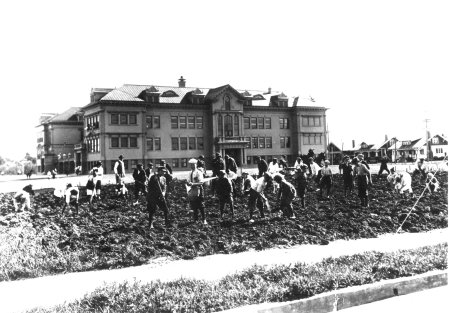
Richmond History
Richmond--the district's oldest operating building

Students tend a garden at Richmond School
in 1908, the year the school was built.
Richmond is the district's oldest standing school
(the first was built in 1851).
Richmond students through the years
 1916 |
 1919 |
 1925 |
 Unknown date |
 1929 |
|
 1931 |
 1962 |
|
Words to the school song
If you think you can you can |
Monica Lanctot, class of 1983 "I remember the community - parents and teachers all got together to lay sod and build that really neat house structure with the slide." |
| Michelle Lanctot, class of 1982 "I can tell you one of my fondest memories was when Mrs. Doyle, the music teacher, asked me if I wanted to play the violin. I don't think I was ever so happy as when she fitted me with my first, very tiny violin. It was in the 3rd grade and I felt so grown up." |
History of Japanese Immersion at Richmond Elementary School
Richmond Elementary School started the Japanese language immersion program in Portland Public Schools in 1989. Richmond received the Excellence in International Education Award in 2005 by the Goldman Sachs Foundation and the Asia Society. Our thriving program was selected for this honor from a pool of almost 500 applicants from 48 states. In October 2006, we received the designation as an "Exceptional School" by the Oregon Department of Education for our 2006 achievement in reading and mathematics. We believe the following features contribute to Richmond's longevity and success:
- Richmond students start learning Japanese from their first day of preschool or kindergarten. This early start allows us to capitalize on young students' natural propensity for language learning. Our immersion model has been so successful for our students that we have added two additional classes of kindergarten to increase our kindergarten enrollment by 100%. We have also opened a Japanese immersion pre-school in 2006 for 3 and 4 year old children that has been incredibly successful with children and families.
- Collaborative planning and partnerships with leaders from the Japanese community (e.g. Japanese Consulate, Japanese Garden Society, Nikkei Legacy Center, Japanese American Society), local and state government, higher education (Carl Falsgraf at University of Oregon) and corporations (e.g. Yoshida's, Honda, Toyota, Nike, etc.) have been essential to our successful Japanese language immersion program. Our model has been replicated by PPS for our new Chinese immersion program with funding from the US
Department of Defense.
- Experienced teaching teams at each grade level work together to plan carefully integrated instruction for our Japanese immersion model. Teams expand through the middle and high school pathway.
- Integration of Japanese culture and language into the core curriculum – a process that naturally models and extends students' interest and study to other cultures.
- Native-Japanese interns at each grade level support students at school and at home via homestays.
- Nationally recognized Japanese curriculum for K-12 covers oral and written language (Kanji, Katakana and Hiragana) and cultural perspectives.
- Menu of enrichment classes to support language growth and cultural appreciation extend learning beyond the school day and year (e.g. classes in Taiko, calligraphy, kendo; Kurabu summer camp; 5th grade trip to Japan; hosting interns and visiting students from partner schools in Japan).
- Extremely committed and involved parents enable educators to focus on continual improvement of instruction. Oya No Kai, Inc. is a non-profit organization to support and promote Japanese culture and enrichment throughout the Japanese Magnet Program PreK-12. Our PTA supports a variety of school activities and events, while our Richmond Foundation raises money to help us fund essential support staff.